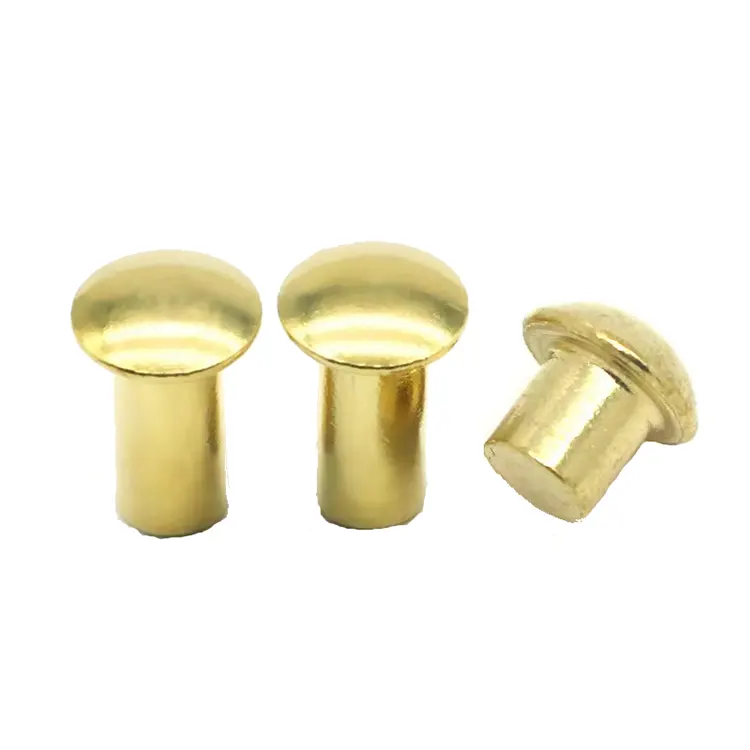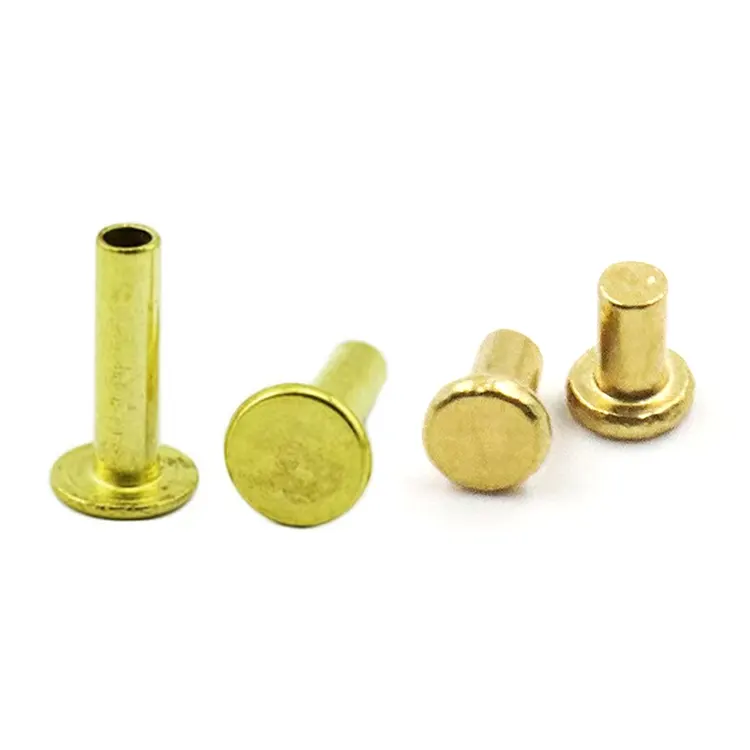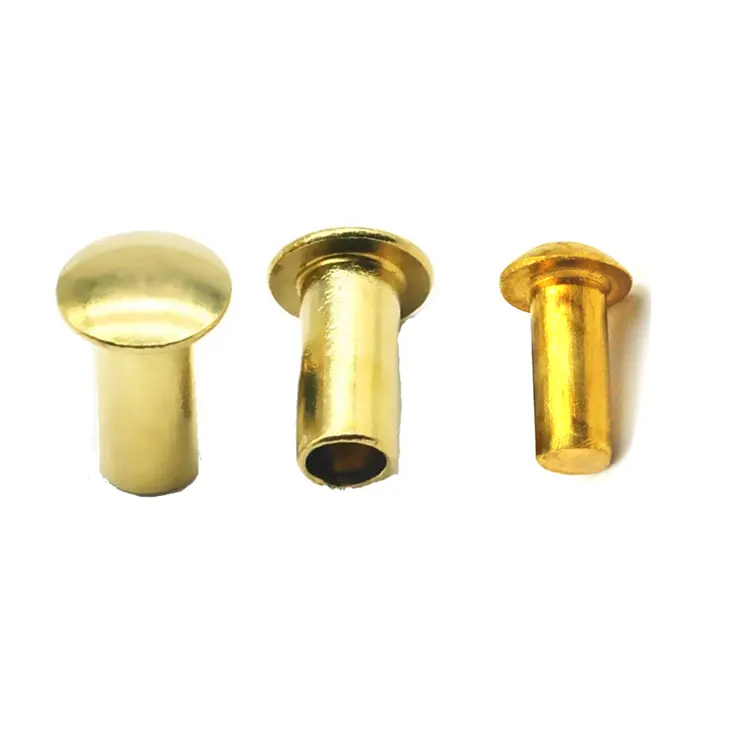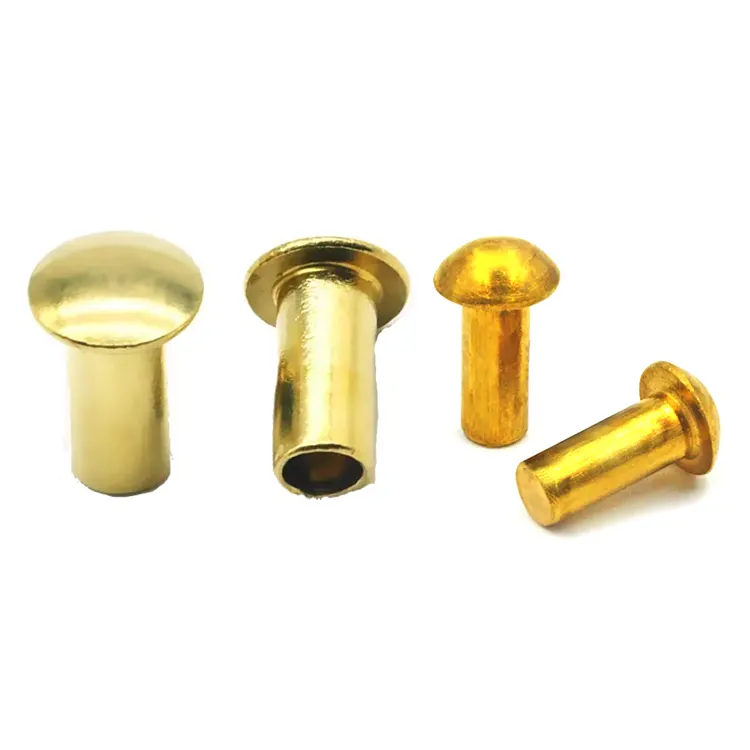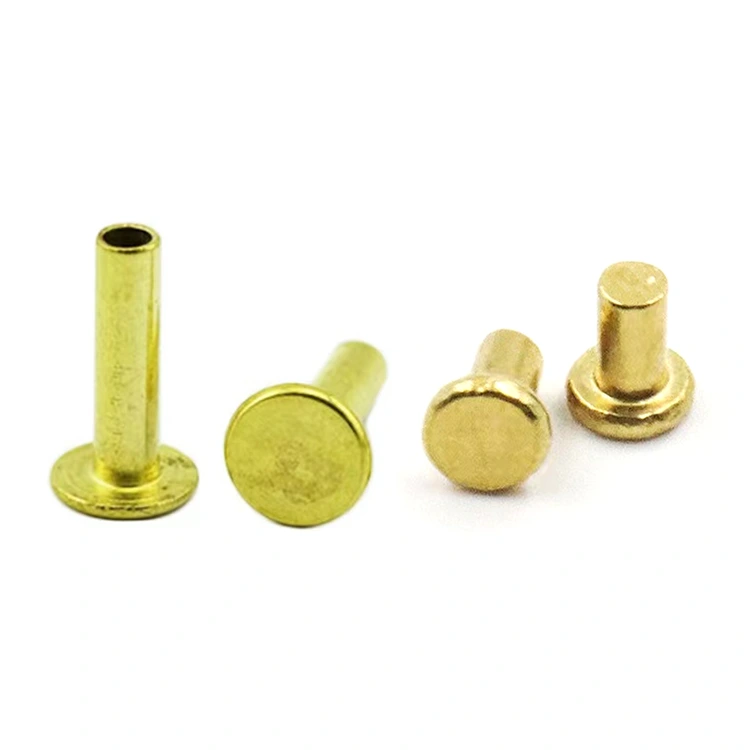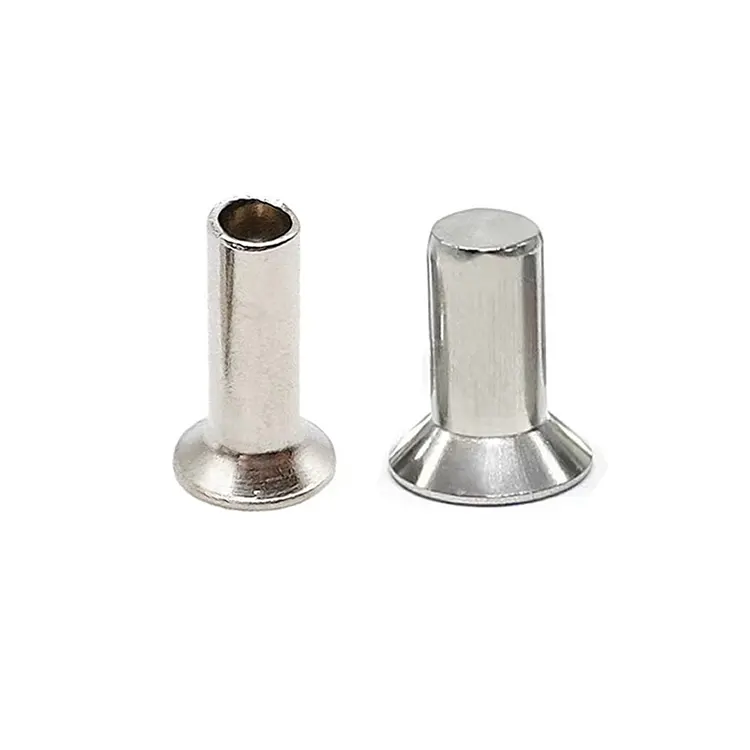Klinknagels
As one of professional manufacturer in China, Notin would like to provide you Rivets. And we will offer you the best after-sale service and timely delivery.
What is a rivet?
A rivet is a permanent mechanical fastener used to join two or more materials. Rivets work by inserting a metal pin into an aligned hole and deforming the end, creating a strong, secure, and durable connection. Unlike temporary fasteners like screws, rivets do not rely on threads, but instead form a permanent connection, making them ideal for applications requiring high strength, durability, and vibration resistance.
Classification of Rivets
Rivets are typically categorized by head shape, degree of hollowness, or material.
Based on head shape, rivets can be classified as flat head rivets, round head rivets, countersunk head rivets, mushroom head rivets, universal head rivets, truss head rivets, etc.

Based on degree of hollowness, rivets can be classified as solid rivets, semi-tubular rivets, or full tubular rivets.
Based on material, rivets can be classified as brass rivets, stainless steel rivets, steel rivets, aluminum rivets, copper rivets, etc.

What surface finishes are available for rivets?
Rivet surfaces are typically treated with rust-proofing treatments, primarily electroplating, including zinc plating, nickel plating, chrome plating, tin plating, gold plating, and silver plating. Electroplating is a common rust-proofing method for rivets. It applies a layer of plating to the rivet surface through physical or chemical methods. The plating effectively prevents corrosion and rust, while also providing a certain aesthetic effect.
Another special surface treatment method is head coating. Head coating is performed after the rivet is electroplated. This allows for a variety of colors on the rivet head, achieving an aesthetically pleasing finish.
Aluminum rivets cannot be electroplated, but they can be anodized. Anodizing also allows for a variety of color options, but the unit price is higher than electroplating.
Rust-proofing the rivet surface is crucial, effectively extending the rivet's service life and ensuring a secure connection. Different rust-proofing methods are suitable for different environments and applications, so the choice should be tailored to the specific situation.
- View as
Messing klinknagels met ronde kop
Nuote Metals is gespecialiseerd in de productie en verkoop van messing klinknagels met ronde kop. Wij zijn gevestigd in Dongguan, China, een stad met een sterke industriële ontwikkeling. Onze koperen semi-uitpuilende kopklinknagels bestaan uit een schacht en kap van een messinglegering. Het semi-uitpuilende kopontwerp zorgt voor een uniforme drukverdeling, waardoor schade aan het gewrichtsoppervlak wordt voorkomen. Ze worden gekenmerkt door hun gecombineerde elektrische geleidbaarheid en corrosieweerstand, eenvoudige constructie, gemakkelijke installatie, hoge betrouwbaarheid en lange levensduur.
Lees verderStuur onderzoekMessing klinknagels
Nuote Metals produceert messing klinknagels in China. Messing klinknagels zijn voornamelijk gemaakt van een koper- en zinklegering, een materiaal dat een scala aan voordelen biedt. Dankzij de uitstekende corrosieweerstand van messing is het bestand tegen langdurig gebruik in vochtige omgevingen zonder te roesten, waardoor het geschikt is voor gebruik buitenshuis of in omstandigheden met een hoge luchtvochtigheid. Messing bezit ook sterkte en hardheid, waardoor het bestand is tegen mechanische belasting, terwijl het een goede taaiheid behoudt en bestand is tegen breuk. Messing heeft ook een uitstekende elektrische en thermische geleidbaarheid, waardoor het geschikt is voor gebruik in elektronische en thermische apparatuur. Het gladde oppervlak van messing maakt eenvoudig galvaniseren of polijsten mogelijk, waardoor de esthetiek wordt verbeterd. Deze eigenschappen maken koperen klinknagels tot een voorkeurskeuze in veel industrieën.
Lees verderStuur onderzoekMessing pankopklinknagels
Nuote Metals is gespecialiseerd in de productie van koperen platkopklinknagels. Onze klinknagels zijn gemaakt van H65-messing, dat een hoog messinggehalte heeft, zacht is en gemakkelijk te vormen is en minder snel barst tijdens het klinkproces. Messing platkopklinknagels bestaan uit een kop en een schacht, waarbij de schacht ongeveer de helft van de lengte hol is. Tijdens de installatie wordt de klinknagel in een voorgeboord gat gestoken. Met behulp van een gespecialiseerde klinkmachine en pons zet het uiteinde van de schacht uit en vormt aan de andere kant de kop, waardoor een klemverbinding ontstaat. Dit proces is gebaseerd op plastische vervorming van het metaal, waardoor lassen of lijmen niet meer nodig is, waardoor het eenvoudig en efficiënt is.
Lees verderStuur onderzoekMessing paddestoelkopklinknagels
Messing paddestoelkopklinknagels bestaan uit een kop en een lichaam. De kop is rond en enigszins afgeplat en lijkt op een paddestoelhoed. De body is semi-holle, wat betekent dat er een gat in het midden zit, maar er niet helemaal doorheen gaat. Dit worden messing semi-holle paddenstoelklinknagels genoemd. Sommige klinknagels hebben een stevig lichaam, de zogenaamde messing massieve paddestoelkopklinknagels. Tijdens de installatie wordt een speciaal gereedschap gebruikt om de behuizing in het voorgeboorde gat te steken. Er wordt druk uitgeoefend om het lichaam te vervormen, waardoor het uitzet en het materiaal vastgrijpt, waardoor een veilige verbinding ontstaat. Nuote Metals is gespecialiseerd in het produceren van deze messing paddestoelkopklinknagels.
Lees verderStuur onderzoekMessing klinknagels met platte kop
Messing klinknagels met platte kop zijn metalen staven met een dop aan één uiteinde. Ze bereiken klinknagels door vervorming of interferentiepassing en zijn een veelgebruikt bevestigingsmiddel. Het platte kopontwerp vermindert de uitsteeksels van het oppervlak, waardoor het geschikt is voor toepassingen die een hoge vlakheid vereisen. De corrosiebestendigheid van messing zorgt voor stabiliteit van de verbinding, zelfs in vochtige en corrosieve omgevingen. Nuote Metals is gespecialiseerd in de productie van messing klinknagels met platte kop. We hebben duizenden mallen en kunnen een verscheidenheid aan klinknagelspecificaties produceren. We ondersteunen ook aangepaste ontwerpen en monsters.
Lees verderStuur onderzoekMessing verzonken kop klinknagels
Messing klinknagels met verzonken kop bestaan voornamelijk uit een kop en een schacht. De verzonken kop maakt een vlakke installatie met het werkstukoppervlak mogelijk, waardoor uitsteeksels worden geëlimineerd die het uiterlijk of de functie kunnen beïnvloeden. De halfholle schacht vervormt tijdens het klinkproces, waardoor een verbinding ontstaat. Dit ontwerp verbetert niet alleen de installatie-efficiëntie, maar verbetert ook de betrouwbaarheid van de verbinding. Nuote Metals is gespecialiseerd in de vervaardiging van messing klinknagels met verzonken kop, die een hoge precisie en een glad, krasvrij oppervlak kenmerken. Wij heten vrienden van over de hele wereld welkom om ons bedrijf te bezoeken en met ons samen te werken.
Lees verderStuur onderzoekWhat are the advantages of rivets over other fasteners?
1. Ease of Installation
Rivets are fast to install, and even fully automated for high-volume applications, resulting in a simple and efficient operation process.
2. Connection Reliability
The riveting process is standardized, with strict quality control, resulting in highly stable connections. Visual inspection allows for quick verification of connection quality.
3. Vibration and Impact Resistance
Rivets connect through deformation or interference fit, providing strong clamping force and excellent vibration resistance, capable of withstanding vibration and shock.
4. Low Cost
Rivets are easy to install and can be fully automated, saving significant labor costs.
What are the advantages and disadvantages of rivets made of different materials?
Aluminum Rivets
Advantages: Lightweight, reduces overall product weight, low cost, suitable for general civilian applications.
Disadvantages: Low tensile and shear strength, unsuitable for high-strength workpieces, prone to electrochemical corrosion when in contact with metals such as stainless steel.
Stainless Steel Rivets
Advantages: Strong corrosion resistance, high hardness, suitable for high-strength workpieces (such as marine equipment)
Disadvantages: Higher cost, typically more expensive than aluminum rivets of the same specification.
Brass and Copper Rivets
Advantages: Excellent conductivity (such as connecting electronic components), good corrosion resistance.
Disadvantages: Higher cost, more difficult to process.
Steel Rivets
Advantages: High hardness, high connection reliability, and wide applicability.
Disadvantages: Compared to other materials, iron rivets are more prone to rusting.
What are the main applications of rivets?
Rivets have a wide range of uses, from small items like a pair of scissors to large items like airplanes and ships, as well as in high-precision medical applications.
Industrial Manufacturing
Rivets are used in a wide variety of industrial fields, wherever there is a need to connect two or more materials.
Electronics
Rivets secure heat sinks and chips, providing both vibration damping and noise reduction, and are widely used in the cooling systems of electronic products such as computers and mobile phones.
Automotive
Rivets are widely used to connect components of automobile bodies and chassis, such as doors and hoods. Their lightweight and corrosion-resistant properties make them an indispensable joining method in automotive manufacturing.
Aerospace
In aircraft manufacturing, rivets are used to connect different fuselage components, such as wings and tailplanes. Millions of rivets create high-strength, corrosion-resistant joints. Aluminum and titanium alloy rivets are often used to connect components of corresponding materials, ensuring stability in extreme environments.
Rivets are used everywhere. The above examples only represent a small number of their applications. We see rivets everywhere in our daily lives, such as on scissors, folding beds, and strollers etc. Rivets can be customized to different sizes and materials depending on the application.
Nuote Metals has specialized in the rivet industry for over a decade. Our factory is located in Dongguan, a city known as the "World Factory," a city with a developed industry and convenient transportation. This allows us to respond quickly when acquiring raw materials and supporting surface treatments, meeting our customers' needs for quick access to samples and bulk orders. We produce 10 million rivets daily and have molds of various specifications, allowing us to produce rivets as small as 0.8mm and as large as 10mm. We welcome your inquiries and visits.







